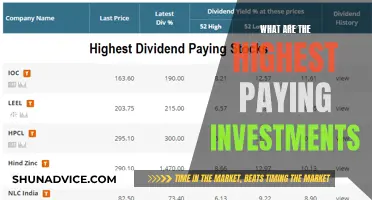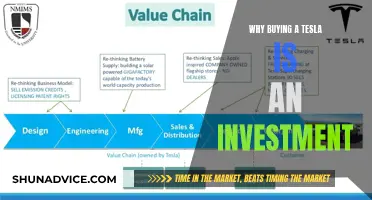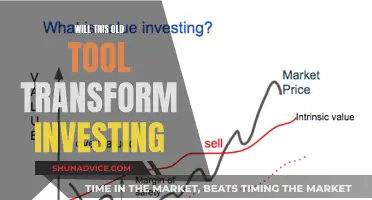
Hertz Global Holdings, Inc. is an American car rental company that filed for bankruptcy in May 2020, citing sharp revenue decline and future booking losses due to the COVID-19 pandemic. Despite this, Hertz's stock has been heavily traded by investors, with its stock price rising nearly 1000% from 59 cents to $5.50 a share after bankruptcy. Hertz's stock has been described as a wild tale in the market, with investors seemingly looking to buy the dip. Hertz's decision to sell more shares to raise cash has been approved by a judge, although the U.S. Securities and Exchange Commission has since halted this. Hertz's bankruptcy and subsequent stock activity highlight the risks of investing in bankrupt companies.
| Characteristics | Values |
|---|---|
| Stock price | $7.73 - $8.00 |
| 52-week range | $7.08 - $20.48 |
| Shares outstanding | 305.3M |
| Public float | 137.41M |
| Rev. per employee | $347.07K |
| Short interest | 27.56M |
| Average volume | 5.26M |
| Hertz's market share | 36% |
| Hertz's rank in Fortune 500 list | 326th |
| Hertz's revenue as of December 31, 2021 | $7.3 billion |
| Hertz's assets as of December 31, 2021 | $19.7 billion |
| Number of employees as of December 31, 2021 | 23,000 |
What You'll Learn
- Hertz's stock rose nearly 1000% from 59 cents to $5.50 a share after its bankruptcy filing
- Hertz is one of the three big rental car holding companies in the US, with a 36% market share
- Hertz's stock has been heavily traded by retail investors, becoming one of the most-traded stocks
- Hertz sold $29 million in stock before the Securities Exchange Commission halted further sales
- Hertz's bankruptcy filing started a 60-day clock, during which its secured lenders must wait before foreclosing on its 400,000 US cars

Hertz's stock rose nearly 1000% from 59 cents to $5.50 a share after its bankruptcy filing
The Hertz brand played a crucial role in attracting investors. Some believed that the brand could eventually sell for enough to return value to equity holders. This faith in the brand, coupled with speculation and external factors like the pandemic, contributed to the dramatic rise in Hertz's stock price.
It is worth noting that Hertz's stock surge occurred despite billionaire investor Carl Icahn liquidating his entire stake at a significant loss. Icahn had been invested in Hertz since 2014 but chose to exit his position as the company filed for bankruptcy. This highlights the contrasting strategies and risk appetites of different investors.
The Hertz stock surge also demonstrates the changing nature of the stock market in the meme-stock era, where retail investors can significantly influence a company's stock performance, even in the face of seemingly negative news like bankruptcy filings.
Investments: Where People Put Their Money
You may want to see also

Hertz is one of the three big rental car holding companies in the US, with a 36% market share
Hertz is a well-known car rental company, with a significant market presence in the US. The company's large market share can be attributed to its popular brands, extensive operations, and broad customer base. Hertz has a strong reputation and has established itself as a trusted choice for car rental services, particularly for airport and intra-city travel.
The company's market position is further strengthened by its focus on technological advancements and customer convenience. They have invested in dedicated mobile apps, improved customer and corporate information management, and hassle-free internet booking applications. This has allowed Hertz to enhance its services and cater to the growing demand for familiar, reliable, and high-quality travel options.
Hertz has also shown adaptability and resilience during challenging periods, such as the COVID-19 pandemic. While the pandemic impacted the overall tourism sector, Hertz implemented safety measures and leveraged opportunities to generate revenue, such as disposing of older cars at a higher volume.
Overall, Hertz's market share and presence in the US car rental industry are significant, and the company continues to be a key player in this market.
Who Manages Your Money?
You may want to see also

Hertz's stock has been heavily traded by retail investors, becoming one of the most-traded stocks
The company announced plans to sell up to $1 billion in new equity, despite disclaimers that there was a risk the stock could become worthless. The sale was approved by a judge, and Hertz sold $29 million in stock before the Securities Exchange Commission halted further sales. This episode highlights the risky nature of investing in bankrupt companies, as creditors have priority over shareholders in claiming any leftover assets. Hertz's situation also demonstrates how market anomalies and investor behaviour can create volatile stock price movements.
GameStop Investors: Who's In?
You may want to see also

Hertz sold $29 million in stock before the Securities Exchange Commission halted further sales
Hertz sold $29 million in stock before the Securities and Exchange Commission (SEC) stepped in to stop further sales. The company raised this money by selling nearly 14 million shares at an average price of $2 each. This sale was made possible by a head-scratching market rally that saw Hertz's stock value increase by more than 1,000% in the weeks following its bankruptcy filing in May.
Hertz initially planned to sell up to $500 million of additional shares to raise cash to see it through the bankruptcy process. A bankruptcy judge approved this plan, but the SEC questioned the situation and took action to prevent further sales.
The investors who bought Hertz's shares before the SEC's intervention did not fare well. The company disclosed that the value of its shares would likely be wiped out during the bankruptcy process, as is typical. Hertz's stock price closed at $1.69 on the day the SEC took action, down 19% since the company's stock sales.
Hertz's primary shareholder, Carl Icahn, sold his entire stake in the company days after the bankruptcy filing, taking a $2 billion loss on his investment. The company also reported a 67% decline in revenue for the second quarter and a loss of $847 million for the same period.
Investing in People: A Risky Business
You may want to see also

Hertz's bankruptcy filing started a 60-day clock, during which its secured lenders must wait before foreclosing on its 400,000 US cars
Hertz's bankruptcy filing started a 60-day clock, during which its secured lenders had to wait before foreclosing on its 400,000 US cars. This cooling-off period was mandated as part of the bankruptcy process, giving Hertz time to negotiate with its creditors and attempt to restructure its debts.
Hertz financed most of its operations through loans secured by its fleet of cars. This meant that if the value of its cars decreased, lenders could demand immediate payment to reduce the loan amount, ensuring they remained covered by the lower value of the collateral.
The COVID-19 pandemic caused a collapse in rental car demand and a decline in used car values, which put Hertz in a precarious position. The company had already made questionable decisions about its fleet and taken on significant debt. When the crisis hit, Hertz lost most of its customers, and the value of its cars fell. As a result, Hertz was unable to make the payments its lenders were entitled to, and it filed for bankruptcy.
The 60-day waiting period provided an opportunity for Hertz and its creditors to negotiate a deal that could prevent or reduce the foreclosure of its vehicles. However, any agreement would likely involve the liquidation of a substantial portion of the 400,000 cars as Hertz prepared to continue operating in a challenging market with reduced business and leisure travel.
During this period, Hertz also attempted to raise up to $1 billion by selling new shares, despite cautioning investors that the stock could be worthless. The company managed to raise $29 million before the SEC intervened. The situation highlighted the complex dynamics between Hertz, its creditors, and retail investors during the bankruptcy process.
Investment Strategies: How to Choose?
You may want to see also
Frequently asked questions
Hertz is a well-known American car rental company with a large global presence. It has a significant market share in the US and is one of the largest vehicle rental companies worldwide by sales, locations, and fleet size.
Hertz filed for bankruptcy in May 2020, citing a sharp decline in revenue and future bookings due to the pandemic. The company had about $1 billion in cash to support its operations, but the drop in used car values during the economic slump put it in a difficult position with its lenders.
Hertz's stock price fell, and many investors likely sold their shares. However, some investors saw this as an opportunity to buy the stock at a low price, hoping for a rebound. Hertz even considered selling more shares to raise cash, but the plan was halted by the Securities Exchange Commission.
Hertz emerged from bankruptcy in July 2021 and has since made significant moves towards electrification of its fleet, including large orders of Tesla and Polestar vehicles. However, in early 2024, Hertz announced it would sell a portion of its EV fleet and reinvest in petrol/gas-powered cars due to weak demand and high repair costs for EVs.







